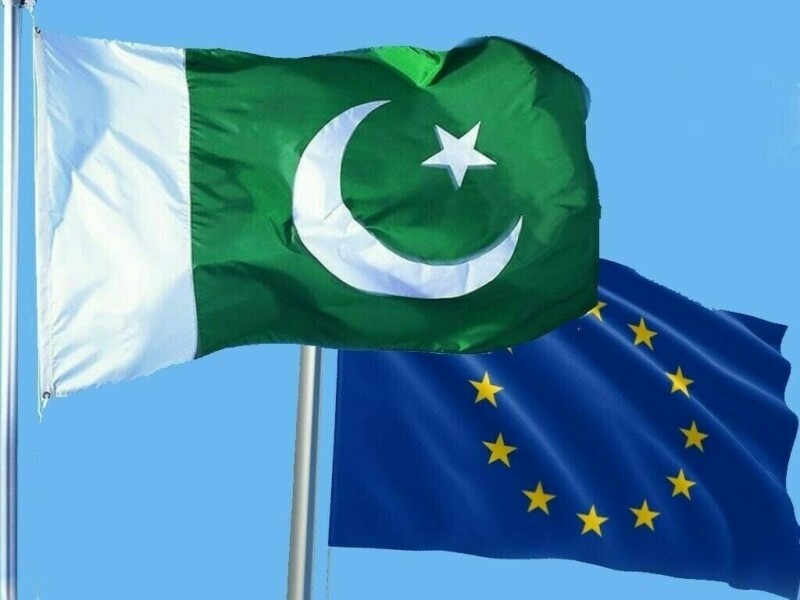Pakistan’s crucial trade advantage under the European Union’s (EU) GSP plus (+) scheme remains under review, as the European Commission evaluates the country’s compliance with international human rights and governance standards.
Dr Martin Henkelmann, CEO at German Emirati Joint Council for Industry and Commerce (AHK UAE) and Florian Walther, Pakistan Representative at German Emirati Joint Council for Industry and Commerce (AHK UAE) said this in response to questions by Business Recorder.
The GSP+ (Generalised Scheme of Preferences Plus) has played a pivotal role in Pakistan’s export-driven economy, allowing over 76% of its exports to the EU — primarily textiles and garments — to enter duty-free.
Since Pakistan joined the scheme in 2014, exports to the EU have more than doubled, reaching €8 billion in 2023, including €2.4 billion to Germany. The development has made EU the single largest export destination for Pakistan.
The ongoing review began in June 2022, resulting into extending GSP+ trade incentives to Pakistan till 2027. The upcoming announcement of the outcome from the ongoing assessment on the 27 conventions would guide the EU to further extend the GSP+ status for Pakistan beyond 2027, it was learned.
“Pakistan’s GSP+ status remains under systematic review by the European Commission as part of the ongoing monitoring cycle. While the Commission has not yet issued a formal conclusion, recent developments—including the visit of EU Special Representative for Human Rights Ambassador Olof Skoog in late January 2025—highlight the significance of this process,” Henkelmann and Walther informed.
GSP+ monitoring mission is scheduled for June 2025, it was learnt.
The two German officials said there was an ongoing and open dialogue between the EU and Pakistan on improving compliance with the 27 core international conventions related to human rights, labour rights, environmental protection, and good governance.
“In our own engagements with stakeholders across Pakistan—including chambers of commerce, export associations, and the business community itself—it is consistently highlighted that GSP+ is not just a trade preference but a vital enabler of employment, growth, and economic diversification. There is widespread awareness that continued progress regarding the GSP+ requirements is necessary and in the country’s long-term interest,” they added.
In response to evolving global priorities, the EU has revised the GSP+ framework. The updated scheme includes additional conventions, stricter procedural obligations, and now requires beneficiary countries to submit detailed action plans.
“Pakistan has been given a two-year transition period to meet the new standards.”
The extension of the monitoring cycle from two to three years allows for more comprehensive evaluations and aligns the process with international mechanisms.
Pakistan must now demonstrate measurable reforms, they said.
With exports under pressure and jobs linked to the EU market access, Pakistan’s path forward in retaining GSP+ will depend on its ability to adapt to the tighter framework—and reassure partners like Germany of its commitment to reforms.
The EU has already updated the GSP+ framework to better reflect evolving global challenges and policy priorities. The revised scheme introduces additional international conventions and sets out stricter procedural requirements, including the obligation for candidate countries to submit a detailed action plan demonstrating how they will implement these conventions.
“For existing beneficiaries like Pakistan, a transitional period of two years has been granted to ensure compliance with the enhanced obligations. The extension of the monitoring cycle from two to three years also aligns the process more closely with international treaty mechanisms, allowing for deeper, more structured evaluations. These updates aim to preserve the integrity and effectiveness of GSP+.”
For Pakistan, this means that continued access to the scheme now depends even more clearly on measurable reforms.
The GSP+ status has enabled robust export growth—especially in the textile sector—and serves as a cornerstone of EU-Pakistan economic relations.
The continuation of GSP+ is not only a trade priority, it is crucial for maintaining export competitiveness, creating jobs, and sustaining bilateral trade momentum.


